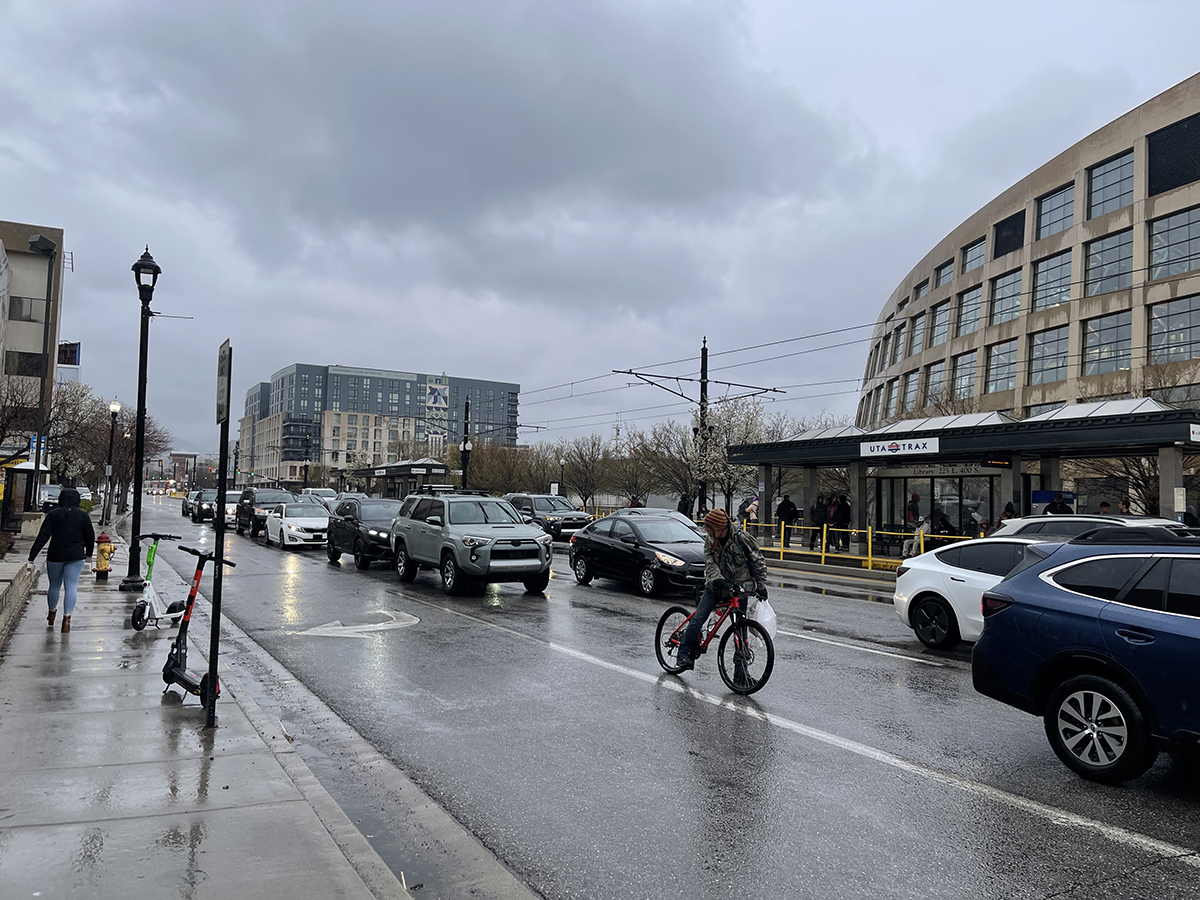By David Ward – I learned of the hit cyclist on the MBAC (Mayor’s Bicycle Advisory Committee) email list. A man posted a link to a Fox 13 news story on the incident. Included was a video of the accident which showed an SUV hitting the cyclist from behind. Occurring on 4800 South at approximately 900 West in Taylorsville, Utah, it is clear the driver of the SUV did not see the cyclist. Remarkably, the cyclist, who first rolled up onto the hood and then fell back onto the road ahead, walked away from the accident with only minor injuries.
[Editor’s Note: this article originally appeared in the Winter 2016/2017 issue of Cycling Utah. References to time should bear that in mind. While incidents like the one mentioned happen everyday somewhere in the country, this particular incident is not a recent one.]
 As it turns out, the driver was a 16 year old girl who had been distracted while driving. The story does not say what caused the distraction. Also as it turns out, the cyclist did not want charges to be pressed against the girl, and so, while given a stern warning, she was not cited.
As it turns out, the driver was a 16 year old girl who had been distracted while driving. The story does not say what caused the distraction. Also as it turns out, the cyclist did not want charges to be pressed against the girl, and so, while given a stern warning, she was not cited.
The accident was disconcerting as it so vividly portrayed what can happen to a cyclist if a driver is inattentive and/or distracted. Such an accident would normally result in serious injury, and potentially death, for the cyclist. A person’s instinctive reaction in watching the video is that the driver needs to be punished, especially where she is so clearly at fault.
But what was also disconcerting to me was the stream of emails on the MBAC list reacting to the fact the girl was not cited. Almost without exception, they were incensed at this. I was, frankly, dismayed by the anger and sense of vengeance expressed toward this girl.
It brought to mind a piece I heard on NPR’s “This American Life” several years ago entitled, “Life After Death”. It was actually a collection of three stories, but the one that has stayed with me was about a high school senior, Darin Strauss, who, while driving, was coming up on a pair of girls cycling in the same direction he was headed. One of them suddenly swerved in front of him. Unable to react in time, he hit her and she was killed.
The focus of the story is on Darin, the driver of the car and the impact this accident had on him. He was not at fault, and could have done nothing to prevent the accident. Yet the pain and trauma he suffered, and the myriad personal issues he had to deal with, are sad and compelling. I have remembered how, when dating later, he always had this question nagging him, “When do I tell her what I did?” And he talked of how, had their roles been reversed, he would like this girl to be spared the feeling of “traveling with a ghost’ which he had done in the two decades since he had hit and killed her.
So when there are accidents involving cyclists being hit by cars, and I hear or read the outrage of my fellow cyclists, I think of this piece from “This American Life”. With this particular accident last month, I can’t help but think of the emotional trauma that 16 year old girl is likely suffering. Unlike Darin, she has the good fortune that the cyclist was not seriously injured.
And interestingly, she may be spared much emotional trauma by virtue of the fact that she was clearly at fault. At the end of this NPR piece, there is a note about a “a psychologist named Ed Hickling, who wrote a book about overcoming the trauma of a car accident. And he says that drivers who have done nothing wrong in an accident are actually at greater risk of developing post-traumatic stress disorder about the accident than people who were really at fault for an accident. Quote, ‘someone who falls asleep at the wheel knows what they can do to prevent future accidents. Innocent drivers,’ Hickling says, ‘realize they’re at the mercy of the universe.’”
So, by being at fault, this girl can actually reduce the trauma she might experience by recognizing that she needs to be alert and undistracted while driving, and, gratifyingly to me, to watch closely for cyclists. And after all, isn’t that what we want? Do we want her punished for the sake of vengeance, or is it that we want her to learn an important lesson, one that will increase the safety of herself and others when she is driving?
I recognize there are other issues relating to the failure to cite drivers hitting cyclists. Is there a bias on the part of police against cyclists? Is there a perception that it is the cyclist who must somehow have been at fault? Do people need to be cited to help increase the awareness of cyclists on the part of drivers? These and other issues are legitimate and fair issues to be addressed.
But I don’t like sensing that many cyclists, when such incidents come to light, want punishment for the sake of punishment. I don’t think that is right. How many of us have done things, either accidently or intentionally, that we wish we could go back and undo? And for which that emotional trauma has been sufficient punishment to learn an important lesson?
In this particular incident, in watching the video, it is clear the girl was traumatized by what happened.. She immediately jumped out of her vehicle and ran to the cyclist. Based on the circumstances, and the desire of the cyclist, she was not cited. Hopefully, that is because the officer recognized the girl’s trauma was punishment enough, and that an important lesson was learned, thankfully without serious injury.












